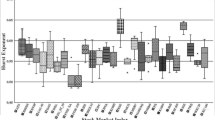
Overview
Access this book
Tax calculation will be finalised at checkout
Other ways to access
About this book
Similar content being viewed by others
Keywords
Table of contents (7 chapters)
-
Front Matter
-
Back Matter
About the authors
MICHÉLE SANGLIER is Director of the Cellule de Modelisation de la Complexite en Sciences Sociales at the Solvay Institute for Physics and Chemistry. She is also Chargée de cours at the Université Libre de Bruxelles. Her main research interest is the application of the idea of dissipative structures to socio-economic systems.
PAUL BRENTON is Senior Research Fellow at the Centre for European Policy Studies in Brussels. He was formerly a lecturer at the University of Birmingham. He has written widely on economic issues, with a particular focus on international trade and foreign direct investment.
Bibliographic Information
Book Title: Modelling the Growth of Corporations
Book Subtitle: Applications for Managerial Techniques and Portfolio Analysis
Authors: Jacques Solvay, Michèle Sanglier, Paul Brenton
DOI: https://doi.org/10.1057/9781403907592
Publisher: Palgrave Macmillan London
eBook Packages: Palgrave Business & Management Collection, Business and Management (R0)
Copyright Information: Palgrave Macmillan, a division of Macmillan Publishers Limited 2001
Hardcover ISBN: 978-0-333-94642-8Published: 03 August 2001
eBook ISBN: 978-1-4039-0759-2Published: 03 August 2001
Edition Number: 1
Number of Pages: XV, 125
Topics: Business Strategy/Leadership, Organization, Investments and Securities, Management



